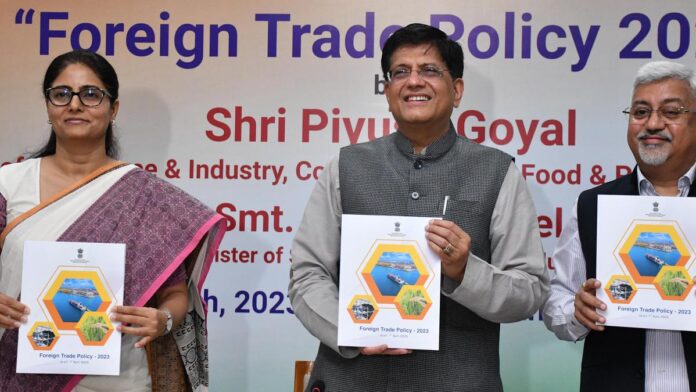
Commerce and Industry Minister, Piyush Goyal with Ministers of State Anupriya Patel and Commerce Secretary Sunil Barthwal releasing ‘Foreign Trade Policy 2023’, in New Delhi on March 31, 2023.
| Photo Credit: KAMAL NARANG
Marking a significant shift in the country’s stance on allowing transit of goods in and out of neighbouring countries, the new Foreign Trade Policy (FTP) has introduced an additional consideration in providing such trade transit facilities for adjacent countries — India’s strategic and economic interests.
The changed language in provisions pertaining to transit facilities, as well as a subtle shift in the stance on trade with neighbouring countries in the new policy, released by Commerce and Industry Minister Piyush Goyal on March 31, could unnerve some land-locked countries around India such as Nepal and Bhutan that rely on goods’ transit through India.
The Foreign Trade Policy 2015-20 that was applicable till last Friday stated: “Transit of goods through India from/or to countries adjacent to India shall be regulated in accordance with bilateral treaties between India and those countries and will be subject to such restrictions as may be specified by DGFT [Directorate General of Foreign Trade] in accordance with international conventions.”
This has been revised in Section 2.23 of the new FTP document to state that such transit of goods “shall be enabled and regulated in accordance with strategic and economic interests of India as well as the bilateral treaties between India and those countries.”
While the previous policy empowered the DGFT to frame schemes or issue necessary instructions “to promote trade and strengthen economic ties with neighbouring countries”, the new policy rephrases the first objective as “promote and regulate trade…”.
Also read: All eyes on China boundary talks as Bhutan King arrives in Delhi
Bhutan King Jigme Khesar Namgyel Wangchuck, accompanied by Bhutanese Foreign and External Trade Minister Tandi Dorji, begins a three-day visit to India on Monday. Nepal Prime Minister Pushpa Kamal Dahal Prachanda is also expected to embark on a bilateral trip to New Delhi soon.
Trade economist Biswajit Dhar said the implications of using the provisions of Section 2.23 must be weighed in light of India’s commitments at the World Trade Organisation (WTO).
“Freedom of transit to landlocked countries are guaranteed under Article V of the General Agreement on Tariffs and Trade. Further, the WTO Agreement on Trade Facilitation of which India is a party to says that ‘regulations…in connection with traffic in transit imposed by Member shall not be applied in a manner that would constitute a disguised restriction’ on traffic in transit,” he told The Hindu.
#Foreign #Trade #Policy #brings #Indias #strategic #interests #trade #transit #ties
